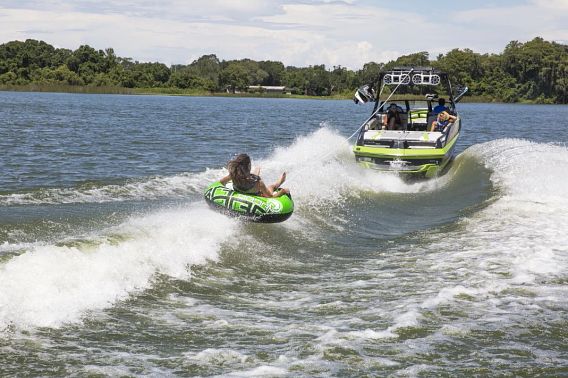Contact: DNR Office of Communications
DNRPress@wisconsin.gov
Boaters: Share The Water And Slow Down To Keep Waters Safe For All
 Boaters should always be mindful of each other and remember to share the water with other users, whether they’re wakeboarding, fishing, paddling or swimming.
Photo credit: Water Sports Foundation
Boaters should always be mindful of each other and remember to share the water with other users, whether they’re wakeboarding, fishing, paddling or swimming.
Photo credit: Water Sports Foundation
MADISON, Wis. – The Wisconsin Department of Natural Resources (DNR) reminds all boaters to monitor their speed and control their wake while underway, as it can negatively affect other boaters and aquatic ecosystems and cause shoreline erosion.
“Wake responsibility is not just about safety; it’s about respect for our beautiful natural resources and fellow water enthusiasts,” Lt. Darren Kuhn, DNR Boating Law Administrator, said. “We urge boaters to be mindful of their speed and wake size, especially in crowded or sensitive areas.”
Some helpful reminders to help boats responsibly manage their wakes include:
- Maintain a safe speed. Always adhere to posted speed limits and reduce speeds in congested areas like channels. Avoid repetitive passes in the same location.
- Watch your wake. Be aware of the size and impact of your wake. Large wakes can cause damage to other vessels and docks, erode shorelines and even swamp or capsize other boats.
- Respect no-wake zones. These areas are specifically designated to protect wildlife and reduce shoreline erosion.
- Teach your passengers. Ensure all aboard your boat understand wake safety and the rules.
More generally, boaters simply need to be mindful of each other and remember to share the water with other users, whether they’re wakeboarding, fishing, paddling or swimming.
“We want everyone to enjoy Wisconsin’s waters while preserving them for future generations,” Lt. Kuhn said. “Let’s work together to make this boating season safe and enjoyable for all.”
Safety First
Safety is the DNR’s top priority. Boaters should always be aware of their surroundings and operate their vessels at speeds appropriate for the current conditions, including weather, boat traffic and size of the water body. Wearing life jackets, avoiding alcohol consumption while operating a boat and being considerate of others using the water are all part of being a responsible boater.
Learn more about boating safety on the DNR’s Boat Safety webpage.

